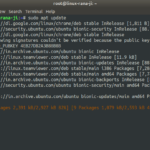Understanding Linux

Linux is a powerful, open-source operating system with its roots in the Unix platform. It is a multi-user, multitasking operating system with a graphical user interface (GUI) and command-line interface (CLI). Unlike Windows, which is a closed-source operating system, Linux allows users to modify, redistribute, and even sell the source code. This makes Linux a popular choice for developers, system administrators, and those who need a stable and secure platform for their computing needs. Linux is also known for its flexibility, scalability, and reliability, making it an excellent choice for server applications and large-scale deployments. Additionally, its open-source nature makes it highly customizable.
What Makes Linux Different from Other Operating Systems?
Linux is an open-source, Unix-like operating system that is both versatile and powerful. It is different from other operating systems in a variety of ways. One of the most significant differences is that Linux is free and open source, meaning that anyone can access the source code and view, edit, or redistribute it without any legal or licensing restrictions. This makes Linux a great choice for developers who want to customize their operating system for a specific task. Additionally, Linux is highly secure and very stable. It is designed to be resistant to malicious attacks and viruses, and it is optimized to run on a variety of hardware platforms, enabling users to choose the most suitable configuration for their needs.
Benefits of Linux for Cloud Hosting

Linux and the cloud, linux is an open source operating system that is widely renowned for its cloud hosting capabilities. This operating system is advantageous due to its numerous features that make it well suited for cloud hosting. Firstly, Linux is incredibly reliable and can be used in almost any environment, making it an ideal option for cloud hosting. Additionally, Linux offers unparalleled scalability that enables it to accommodate the needs of users of all sizes, ranging from small businesses to large enterprises. Furthermore, Linux is incredibly secure and is considered to be one of the most secure operating systems in the world, providing users with peace of mind when hosting their cloud services. Additionally, Linux is highly customizable, allowing it to be adapted to meet the needs of a variety of users.
Security
Linux is a popular operating system choice for cloud hosting due to its inherent security advantages. The Unix-like architecture of Linux provides a secure platform for hosting services and applications. It inherently has fewer vulnerabilities than other operating systems, and its open-source nature allows for frequent security updates to be made available quickly. Linux also has its own built-in security measures, such as SELinux. This is a set of security policies and access control mechanisms designed to protect Linux systems from external threats. Additionally, Linux offers a high degree of customization, allowing users to tailor the security settings to their exact needs. This further enhances the security of cloud hosting services running on Linux. Ultimately, Linux is an excellent choice for cloud hosting solutions due to its security advantages.
Reliability & Performance
Reliability is a concept that is of great importance in the scientific and academic fields due to its ability to measure the accuracy, consistency, and dependability of a given system or set of results. It is an essential component for validating any research study, as it allows for the researcher to identify any potential errors and discrepancies that may have occurred during the data collection process. Reliability can be measured in a number of different ways, such as through the use of internal consistency measures, split-half reliability, and test-retest reliability. Internal consistency measures look at how well items or questions within a given assessment correlate with one another, split-half reliability compares the average of two halves of a given assessment, and test-retest reliability measures .
Benefits of Windows for Cloud Hosting
Windows for cloud hosting is an increasingly popular choice amongst organizations seeking to maximize the efficiency and scalability of their IT operations. By utilizing cloud hosting, organizations can benefit from the flexibility of allocating resources as needed, while paying only for the services they actually use. Windows for cloud hosting also enables organizations to take advantage of advanced features, such as secure authentication and filtering, as well as the ability to access resources remotely. Furthermore, Windows for cloud hosting can provide organizations with increased cost savings as it eliminates the need for physical hardware and software purchases. Additionally, Windows for cloud hosting is a reliable and cost-effective means of managing an organization’s IT infrastructure, as it ensures that applications and services are always available and up to date.
Flexibility Data Handling
Linux is a computer operating system that is renowned for its flexibility when it comes to data handling. It has an advanced file system, which is composed of multiple directories and subdirectories, allowing users to store and access data in a logical and efficient manner. Furthermore, Linux offers a number of tools and techniques that can be used to manage data, such as creating and deleting directories, editing files, and using various commands to perform various operations. Additionally, the operating system allows multiple users to access the same data, allowing for collaboration and sharing of information. This flexibility makes Linux an ideal choice for companies that require the ability to manage and share large amounts of data. In particular, Linux’s data handling capabilities make it suitable for organizations that require secure data management.
Conclusion
The conclusion of Linux and Cloud Computing is that these two technologies can be incredibly powerful tools for businesses and individuals alike. Through leveraging the power of Linux, users are able to access a wealth of software and applications that are designed to make computing easier, more efficient, and more secure. Cloud computing offers organizations and individuals the ability to access computing resources on-demand and at a fraction of the cost of traditional IT infrastructures. By utilizing Linux and Cloud Computing in tandem, businesses and individuals can maximize their efficiency and minimize their costs. Furthermore, by utilizing the cloud for storage and backup, organizations are able to further reduce the security risks associated with local storage and backup solutions. Ultimately, Linux and Cloud Computing are two powerful technologies.






